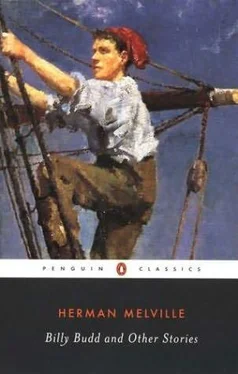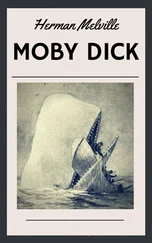To some extent the Nore Mutiny may be regarded as analogous to the distempering irruption of contagious fever in a frame constitutionally sound, and which anon throws it off.
At all events, of these thousands of mutineers were some of the tars who not so very long afterwards — whether wholly prompted thereto by patriotism, or pugnacious instinct, or by both, — helped to win a coronet for Nelson at the Nile, and the naval crown of crowns for him at Trafalgar. To the mutineers those battles, and especially Trafalgar, were a plenary absolution and a grand one: For all that goes to make up scenic naval display, heroic magnificence in arms, those battles, especially Trafalgar, stand unmatched in human annals.
Concerning "The greatest sailor since our world began."
Tennyson
In this matter of writing, resolve as one may to keep to the main road, some by-paths have an enticement not readily to be withstood. I am going to err into such a by-path. If the reader will keep me company I shall be glad. At the least we can promise ourselves that pleasure which is wickedly said to be in sinning, for a literary sin the divergence will be.
Very likely it is no new remark that the inventions of our time have at last brought about a change in sea-warfare in degree corresponding to the revolution in all warfare effected by the original introduction from China into Europe of gunpowder. The first European fire-arm, a clumsy contrivance, was, as is well known, scouted by no few of the knights as a base implement, good enough peradventure for weavers too craven to stand up crossing steel with steel in frank fight. But as ashore, knightly valor, tho' shorn of its blazonry, did not cease with the knights, neither on the seas, though nowadays in encounters there a certain kind of displayed gallantry be fallen out of date as hardly applicable under changed circumstances, did the nobler qualities of such naval magnates as Don John of Austria, Doria, Van Tromp, Jean Bart, the long line of British Admirals and the American Decaturs of 1812 become obsolete with their wooden walls.
Nevertheless, to anybody who can hold the Present at its worth without being inappreciative of the Past, it may be forgiven, if to such an one the solitary old hulk at Portsmouth, Nelson's Victory , seems to float there, not alone as the decaying monument of a fame incorruptible, but also as a poetic reproach, softened by its picturesqueness, to the Monitors and yet mightier hulls of the European ironclads. And this not altogether because such craft are unsightly, unavoidably lacking the symmetry and grand lines of the old battle-ships, but equally for other reasons.
There are some, perhaps, who while not altogether inaccessible to that poetic reproach just alluded to, may yet on behalf of the new order, be disposed to parry it; and this to the extent of iconoclasm, if need be. For example, prompted by the sight of the star inserted in the Victory 's quarter-deck designating the spot where the Great Sailor fell, these martial utilitarians may suggest considerations implying that Nelson's ornate publication of his person in battle was not only unnecessary, but not military, nay, savored of foolhardiness and vanity. They may add, too, that at Trafalgar it was in effect nothing less than a challenge to death; and death came; and that but for his bravado the victorious Admiral might possibly have survived the battle; and so, instead of having his sagacious dying injunctions overruled by his immediate successor in command, he himself, when the contest was decided, might have brought his shattered fleet to anchor, a proceeding which might have averted the deplorable loss of life by shipwreck in the elemental tempest that followed the martial one.
Well, should we set aside the more disputable point whether for various reasons it was possible to anchor the fleet, then plausibly enough the Benthamites of war may urge the above.
But the might-have-been is but boggy ground to build on. And, certainly, in foresight as to the larger issue of an encounter, and anxious preparations for it — buoying the deadly way and mapping it out, as at Copenhagen — few commanders have been so painstakingly circumspect as this same reckless declarer of his person in fight.
Personal prudence even when dictated by quite other than selfish considerations surely is no special virtue in a military man; while an excessive love of glory, impassioning a less burning impulse, the honest sense of duty, is the first. If the name Wellington is not so much of a trumpet to the blood as the simpler name Nelson , the reason for this may perhaps be inferred from the above. Alfred in his funeral ode on the victor of Waterloo ventures not to call him the greatest soldier of all time, tho' in the same ode he invokes Nelson as "the greatest sailor since our world began."
At Trafalgar, Nelson, on the brink of opening the fight, sat down and wrote his last brief will and testament. If under the presentiment of the most magnificent of all victories to be crowned by his own glorious death, a sort of priestly motive led him to dress his person in the jewelled vouchers of his own shining deeds; if thus to have adorned himself for the altar and the sacrifice were indeed vainglory, then affectation and fustian is each more heroic line in the great epics and dramas, since in such lines the poet but embodies in verse those exaltations of sentiment that a nature like Nelson, the opportunity being given, vitalizes into acts.
Yes, the outbreak at the Nore was put down. But not every grievance was redressed. If the contractors, for example, were no longer permitted to ply some practices peculiar to their tribe everywhere, such as providing shoddy cloth, rations not sound, or false in the measure, not the less impressment, for one thing, went on. By custom sanctioned for centuries, and judicially maintained by a Lord Chancellor as late as Mansfield, that mode of manning the fleet, a mode now fallen into a sort of abeyance but never formally renounced, it was not practicable to give up in those years. Its abrogation would have crippled the indispensable fleet, one wholly under canvas, no steam-power, its innumerable sails and thousands of cannon, everything in short, worked by muscle alone; a fleet the more insatiate in demand for men, because then multiplying its ships of all grades against contingencies present and to come of the convulsed Continent.
Discontent foreran the Two Mutinies, and more or less it lurkingly survived them. Hence it was not unreasonable to apprehend some return of trouble, sporadic or general. One instance of such apprehensions: In the same year with this story, Nelson, then Vice-Admiral Sir Horatio, being with the fleet off the Spanish coast, was directed by the Admiral in command to shift his pennant from the Captain to the Theseus ; and for this reason: that the latter ship having newly arrived on the station from home where it had taken part in the Great Mutiny, danger was apprehended from the temper of the men; and it was thought that an officer like Nelson was the one, not indeed to terrorize the crew into base subjection, but to win them, by force of his mere presence, back to an allegiance if not as enthusiastic as his own, yet as true. So it was that for a time on more than one quarter-deck anxiety did exist. At sea precautionary vigilance was strained against relapse. At short notice an engagement might come on. When it did, the lieutenants assigned to batteries felt it incumbent on them, in some instances, to stand with drawn swords behind the men working the guns.
But on board the seventy-four in which Billy now swung his hammock, very little in the manner of the men and nothing obvious in the demeanour of the officers would have suggested to an ordinary observer that the Great Mutiny was a recent event. In their general bearing and conduct the commissioned officers of a warship naturally take their tone from the Commander, that is if he have that ascendancy of character that ought to be his.
Читать дальше












